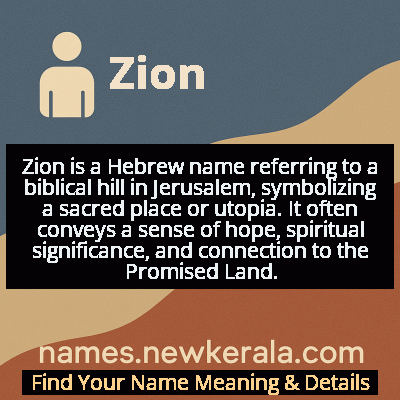Zion Name Meaning & Details
Origin, Popularity, Numerology Analysis & Name Meaning of Zion
Discover the origin, meaning, and cultural significance of the name ZION. Delve into its historical roots and explore the lasting impact it has had on communities and traditions.
Name
Zion
Gender
Male
Origin
Hebrew
Lucky Number
1
Meaning of the Name - Zion
Zion is a Hebrew name referring to a biblical hill in Jerusalem, symbolizing a sacred place or utopia. It often conveys a sense of hope, spiritual significance, and connection to the Promised Land.
Zion - Complete Numerology Analysis
Your Numerology Number
Based on Pythagorean Numerology System
Ruling Planet
Sun
Positive Nature
Leaders, ambitious, highly driven, self-reliant, innovative.
Negative Traits
Overly aggressive, domineering, impatient, selfish.
Lucky Colours
Red, orange, gold.
Lucky Days
Sunday.
Lucky Stones
Ruby, garnet.
Harmony Numbers
2, 3, 9.
Best Suited Professions
Entrepreneurs, managers, engineers.
What People Like About You
Courage, determination, leadership.
Famous People Named Zion
Zion Williamson
Professional Basketball Player
NBA All-Star known for record-breaking athletic performance and scoring prowess
Zion T
Singer and Rapper
Award-winning K-pop artist revolutionizing Korean R&B and hip-hop
Zion Clark
Athlete and Motivational Speaker
Inspirational figure and Guinness World Record holder despite physical challenges
Zion Lateef
Musician
Influential hip-hop artist and producer with distinctive musical style
Name Variations & International Equivalents
Click on blue names to explore their detailed meanings. Gray names with will be available soon.
Cultural & Historical Significance
In Christianity, Zion transformed into a metaphor for the Church and the heavenly kingdom, with numerous references in the New Testament and hymns. The Book of Revelation describes the New Jerusalem coming down from heaven, completing the spiritualization of Zion as the ultimate destination for believers. Rastafarianism later adopted Zion as a central tenet, identifying it with Ethiopia and Africa as the spiritual homeland, creating a powerful symbol of African redemption and resistance to oppression. This multilayered significance makes Zion unique among religious place names, representing both specific holy sites and universal spiritual aspirations across different faith traditions.
Extended Personality Analysis
People named Zion typically exhibit a remarkable blend of spiritual depth and practical leadership that reflects their name's sacred origins. They often possess an innate sense of purpose and direction, combined with the charisma to inspire others toward shared goals. Their strong moral compass frequently guides them toward careers or activities that benefit their communities, and they demonstrate particular skill in mediating conflicts and bringing people together. Many Zions show exceptional resilience, able to overcome significant obstacles through determination and faith in their mission.
In social settings, Zions often become natural centers of their circles, not through aggressive self-promotion but through genuine concern for others and the ability to see the bigger picture. They tend to be excellent communicators who can articulate complex ideas with clarity and passion. While they can be idealistic, most Zions balance their vision with practical action steps. Their combination of spiritual sensitivity and worldly capability makes them effective in roles that require both heart and strategic thinking. Family and community typically hold great importance to them, and they often work to create environments where others can thrive and feel protected.
Modern Usage & Popularity
Zion has transformed from a primarily religious and place name into a popular given name with remarkable momentum in the 21st century. In the United States, the name's popularity trajectory shows a fascinating pattern: after centuries of minimal usage, it began appearing in birth records in the 1990s, entered the top 1000 in 1998, and skyrocketed to reach #187 by 2018. This surge corresponds with several cultural factors, including the rise of biblical names, increased diversity in name choices, and the influence of prominent athletes and entertainers. The name particularly resonates in African American communities where it carries additional significance through Rastafarian connections and the concept of Zion as a symbol of liberation. Contemporary usage spans religious and secular families alike, with parents drawn to its strong phonetic qualities, spiritual connotations, and modern feel. While its peak may have passed, Zion maintains steady usage as a name that bridges traditional significance with contemporary appeal.
Symbolic & Spiritual Meanings
Zion operates on multiple symbolic levels, functioning as both a concrete place and an abstract ideal across religious, political, and personal contexts. At its core, Zion represents the intersection of divine and human realms—a sacred space where heaven touches earth. This makes it a powerful metaphor for moments of spiritual awakening, profound connection, or personal transformation. In psychological terms, Zion can symbolize the integrated self or the achievement of inner peace and purpose. The journey to Zion often represents the human quest for meaning and fulfillment.
Politically, Zion has been appropriated by various liberation movements as a symbol of freedom and self-determination, most notably in Rastafarianism where it contrasts with Babylon as a representation of oppressive systems. Environmental movements sometimes use Zion to represent ecological harmony and the preservation of natural sanctuaries. In artistic and literary contexts, Zion frequently appears as a symbol of utopia, ideal society, or spiritual homeland. The name's rich symbolic tapestry allows it to convey hope, redemption, sanctuary, and divine connection simultaneously, making it one of the most layered and meaningful names in use today.

